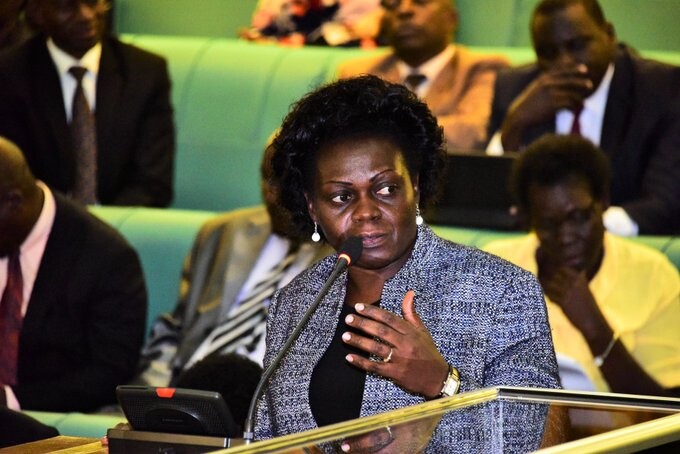Kampala, (UG): Tororo Woman Member of Parliament, Hon Sarah Opendi earlier this month tabled a private member’s bill, dubbed; the Alcoholic Drinks Control Bill, 2023, which seeks among others to regulate the manufacture, sale and consumption of alcoholic drinks.
The Bill, which also seeks to prohibit the sale of alcoholic drinks to children, was tabled during the House sitting on Tuesday, 14 November 2023.
The controversial bill which has already attracted public backlash suggests that all persons found liable for selling alcohol beyond 10 pm and midnight on weekdays and weekends respectively either be fined Shs20 million “or imprisonment for a period of 10 years or both”.
“A licensee shall not sell an alcoholic drink or native liquor before- (a) l7:00 hours and after 22:00 hours on working days; (b) 12:00 hours and after 00:00 hours on public holidays and weekends,” clause 14 of the Bill reads in part.
Hon. Sarah Opendi said the bill has now been gazetted as required by law, noting that she was granted leave of the House to introduce it on 08 November 2022.
WHO data indicates that Ugandan males consume on average 19.93 litres of pure alcohol while their female counterparts muster 4.88 litres. The consumption has seen Uganda rise to 5th position on the index put together by the World Alcohol Consumption Report, a behaviour which has largely been attributed to a culture that fosters so-called binge drinking.
According to Ms Opendi, the Uganda Alcohol Report 2022, published by the Uganda Alcohol Policy Alliance (UAPA) shows that beers account for 11 per cent of alcohol consumed in Uganda, spirits and wines take up three per cent of the alcohol market, with other beverages splitting a beefy 89 per cent.
“Uganda’s statistics on alcohol consumption are particularly worrying because the harmful use of alcohol causes a high burden of disease and has significant social and economic consequences,” Ms Opendi told the House while tabling the bill.
She added; “Alcohol consumption has been found to be associated with increased risk of overall mortality and a number of chronic non-communicable diseases, including coronary artery disease, diabetes, congestive heart failure, and stroke.”
Ms Opendi suggests that “high consumption of alcoholic drinks affects productivity in the communities, thus there is a need to regulate manufacture, sale, protect children from easy accessibility and time for the sale of alcoholic drinks.”
Inside Clause 23 of the Bill, Ms Opendi seeks to curb the sale and or consumption of alcoholic drinks in public service vehicles.
To effect this, a fine of Shs4 million or a jail term of six months or both has been included in the clause. The same punishments are prescribed for a law enforcement officer who while dressed in uniform is found purchasing alcohol.
In clause 25 (3) of the same law, the Bill seeks to impose a Shs40 million fine or jail term of a period not exceeding three years or both for anyone found guilty of selling alcohol to persons below the age of 18 years of age.
For clearance of any doubts about the buyer’s age, the legislation directs the seller to ask the buyer to produce a copy of his or her passport or national identification card to confirm their age.
If clause 26 passes in its current form, a Shs20 million fine or a five-year jail sentence or both awaits anyone found to be packing, importing or even selling an alcoholic drink in a sachet, or plastic bottle.
In clause 27, the Bill proposes a Shs10 million fine or a five-year jail term or both for persons that sell alcoholic drinks in a package of less than 500 millilitres.
Alcohol manufacturing companies, some of which are the biggest taxpayers in the country, have previously taken exception to regulating their industry in the manner that Ms Opendi’s Bill is proposing.
They have severally insisted that their responsible consumption campaigns (headlined by the ‘excessive consumption of alcohol is harmful to your health’ disclaimer and age restrictions) are gaining traction. UAPA and other observers, however, beg to differ.
Statistics offer support.
The 2018 WHO report, for one, pointed out that 1,514 people die annually from alcohol-related cancers like mouth, throat, liver, and breast cancer. The bitter froth, the report added, knocks off five years from the lives of Ugandans who are heavy or binge drinkers.
Recent findings reveal that 7.1 per cent of alcohol consumers, roughly 3.2 million people in Uganda, struggle with alcohol use disorders. Ms Opendi’s Bill says this is all thanks to defects in the existing legal framework.
“The repeal of the Enguli (Manufacture and Licensing) Act, Cap. 86, and the Liquor Act, Cap. 93 by the Law Revision (Miscellaneous Amendment) Act, 2023 left gaps in the legal framework regulating the manufacture and sale of alcoholic drinks,” the Bill states.
“The repealed Enguli (Manufacture and Licensing) Act, regulated the manufacture, sale and possession of enguli. The Act specifically prohibited the sale and export of enguli by unlicensed persons and exclusively preserved enguli as a raw material for distillation of Uganda Waragi by licenced brewers. Most communities in Uganda are consuming unregulated crude alcohol which is harmful to their lives,” it adds.
The Bill proceeds to note thus: “Further the repealed Liquor Act, Cap. 93 regulated the manufacture and sale of liquor to restricted licensed premises. The Act also prohibited the sale: of liquor, the manufacture or sale of native liquor without a licence, and further prohibited the sale of intoxicating liquor to children. After the repeal of the Liquor Act, alcohol is being sold anywhere, any time and accessible to children without any regulation.”
If you would like your article/opinion to be published on Uganda’s most authoritative news platform, send your submission on: [email protected]. You can also follow DailyExpress on WhatsApp and on Twitter (X) for realtime updates.



